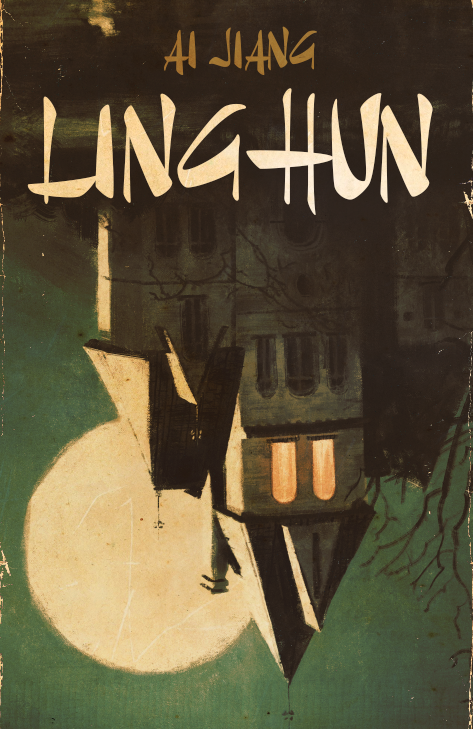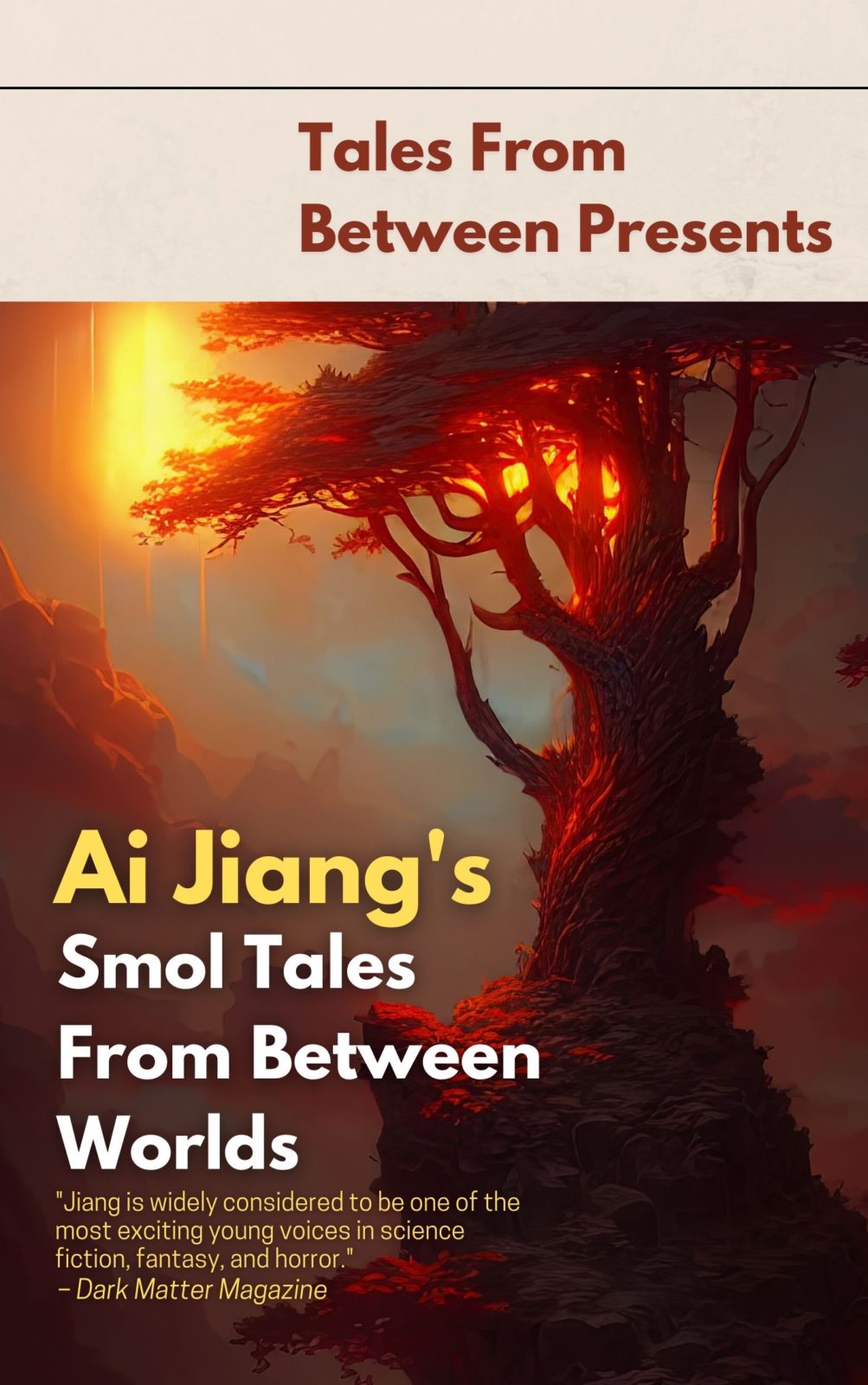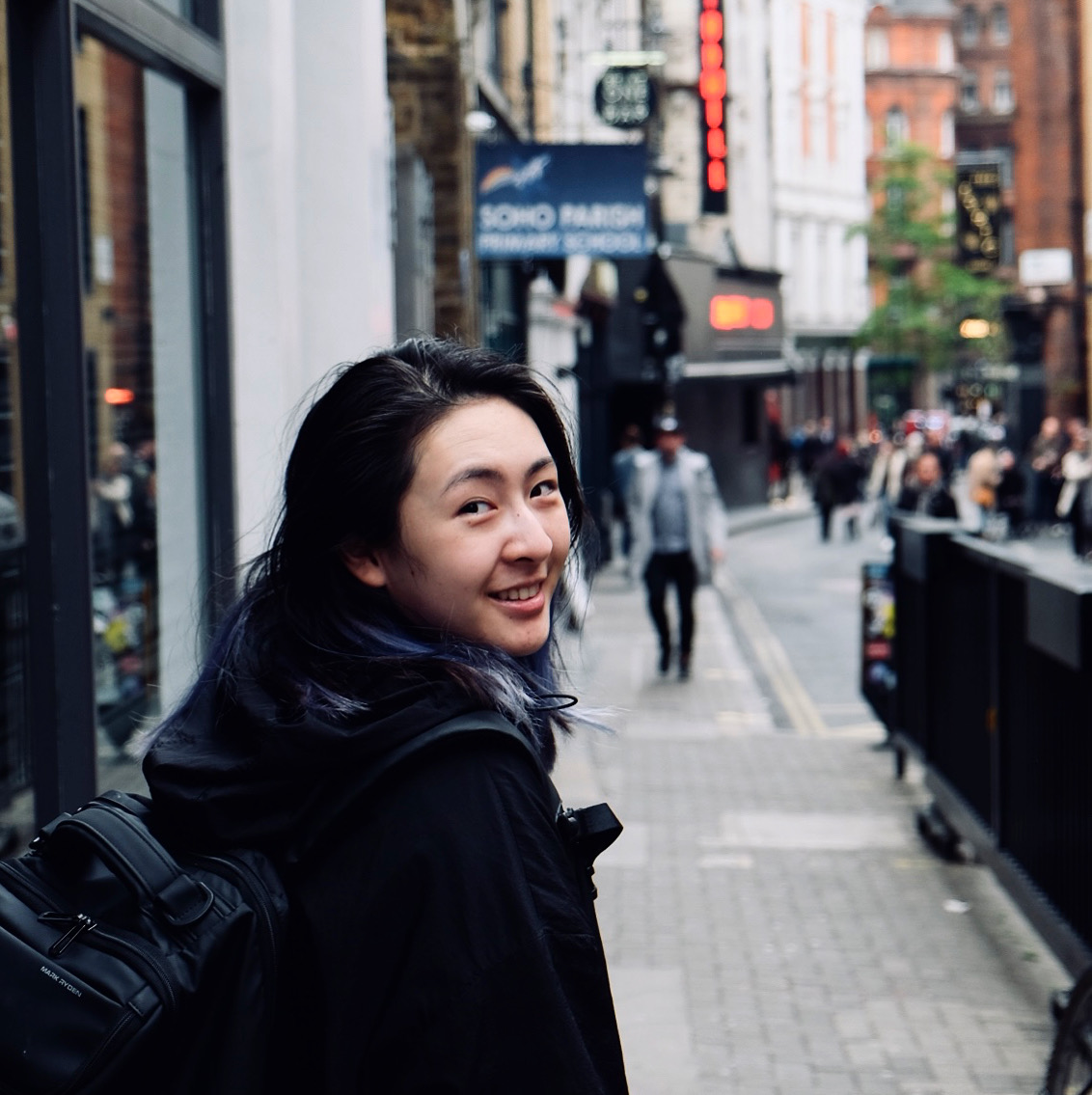Ai Jiang is a Chinese-Canadian writer and an immigrant from Fujian. Her debut novella, Linghun, will be published this spring, as will her collection, Ai Jiang’s Smol Tales From Between Worlds. She also recently announced a new novelette, I Am Ai, coming in June. Her stories have appeared or are forthcoming in The Magazine of Fantasy & Science Fiction, The Dark, Uncanny, Prairie Fire, and The Masters Review, among others. She is a regular guest on speculative podcasts, writes review columns, and spreads cheer across social media.
Thank you, Ai, for pausing your busy schedule to talk with me!
—Myna Chang

MYNA CHANG: I’ve watched your writing career take off like a rocket over the last few years. Congratulations on your success! There are so many topics I’d like to cover. Let’s start with your debut novella, Linghun. What’s it about?
AI JIANG: It’s a three-pov novella that takes place in a town named HOME that lies on the outskirts of Toronto where people go to purchase haunted houses in hopes that they might be able to reunite with the ghosts of their loved ones.
It’s about grief, about how when it begins, it consumes, chews, swallows, and we never know when it might end, if ever—no matter how desperately we want to escape from it, there is always something, someone, dragging us back.
I think what I want readers to feel most through the story is the pain of being left behind, not only by the dead but also by the living.

MC: Quick on the heels of Linghun, you announced two additional projects: Ai Jiang’s Smol Tales from Between Worlds, and I Am Ai. I was (happily) surprised to see these new publications appearing in such a short time span. Can you tell us about these projects?
Ai: I think this is very much a year of passion projects for me, and I hope that the following years will be the same. My only hope is that readers will love and support the art I create for myself and find resonance in what I have drawn from both my life and the world around me in creating these stories and journeys.
Ai Jiang’s Smol Tales from Between Worlds is a mini collection of 12 tales I have written and published in various magazines, many of which are my earlier works that have not garnered as much attention as my later publications. It also includes an unpublished story I wrote when I was first dipping my toes into science fiction, along with an excerpt from the opening of Linghun. I wanted to collect together the pieces that drove my passion for writing and include author notes that touch on what makes each of these pieces so special to me as a writer, something we don’t often get to include when our stories go out into the world.
As for I Am Ai, it’s cyberpunk, a play on my name that I thought would be fun, but it is also semi-autobiographical in how it tackles issues of toxic productivity and the desire to escape human fragility yet also the fear of losing humanity that I have struggled with in my life. It is the fear of being human but also the fear of becoming less human.
MC: One of your critically acclaimed short stories, “Give Me English,” has garnered a lot of attention in the speculative community. I’ve heard you talk about the reception this story has received, including some unexpected invitations to speak. Tell us about the story, your inspiration, and how people have reacted to it.
Ai: “Give Me English” follows a woman named Gillian who has immigrated to the United States to find the success that her parents have hoped for and features a society where language is used as currency.
In writing the story, I thought a lot about the idea of language capitalism and how language is a form of power and control—the way that jargon and language manipulation might take advantage of the vulnerable, those who are not as fluent in a language or do not have hefty vocabularies, people who have just arrived in a country with not much in their pockets and even fewer English words in their mouths, people like my family. It is very much a story about immigration, but it is also a story about the unfairness and unbalance of wealth, and the weaponization of language. People who do not have as much power, money, or influence in society are silenced—whether they have the words to speak out or not, sometimes that choice is already made for them.
I am both surprised and heartened by how many people found resonance in the story, the way they have connected it to their lives, their families, the people they know, their experiences, and I am glad that I was able to present a world and a character that people can identify and empathize with. It’s terrifying, I think, to confront people, to speak out, to use our language in what ways we can to succeed and express ourselves, but it is far more terrifying to have that choice ripped from our hands. I believe it’s a fear that many of us have—to lose the ability to communicate, to lose the power of language.
MC: Your stories often address social issues. Can you elaborate on the themes you pursue? Do you begin with these themes in mind, or do they evolve organically as you write?
Ai: Both my family and my spouse call me a daydreamer, but I think a muser might be a more accurate term because I find myself spending a lot of time musing on philosophical and theoretical questions, about the progression and pitfalls of society, culture, language, humanity, morality, identity, among other topics, and I think that for me fiction is a way to further explore these musings through constructed worlds and characters that might help tackle these topics from various angles.
I often begin with an interesting idea or concept, but often those ideas and concepts are born out of my musings about the world, and so I dig deeper into what the idea/concept is truly trying to say about our society or ourselves before I start writing. But, writing often doesn’t go as exactly planned, and the themes might evolve as the stories progress, and I might discover things about certain themes and ideas that I haven’t realized prior to the actual writing of the story.
I think that’s the beauty of storytelling—we not only get to offer readers a world to explore but also a world where we can wander and try to make sense of things.
MC: Your style is distinctive. Can you talk about your approach to craft elements, such as point of view or language choices?
Ai: I’m a big fan of experimenting with points of view, particularly when it comes to using second-person and also first-person plural, and I think it’s heavily influenced by my exploration of identity—both in fiction and in reality. I think the two points of view I mentioned really bring out the sense of wandering identities, of not feeling like oneself, of still trying to figure out who we are, but also how we might fit into a community of like-minded individuals, and whether that might take away our individualism or help us better enhance and discover it.
In terms of language, in my earlier works, I always struggled with including Chinese names because growing up, I had been made fun of for my name and watched others shun Chinese (as well as other cultural) names for being difficult to pronounce or for being too uncommon. And I had read a lot of discourse in including foreign words in works written in English.
But recently, I have been contemplating a lot about the use of language and the “foreignness” that is introduced through words kept in their original language (such as including words in pinyin), and for me, I think there are some words that do not offer the same “feeling” when written in English compared to the tone spoken and how they are used in Chinese, or there might not be an adequate enough translation, and so I might include these words regardless of the perception of foreignness. I speak further in length about this topic in an upcoming essay I have in Fantasy Magazine.
MC: You’re a powerhouse of productivity. I’m continuously amazed at how much you accomplish. Your notebooks, goals, and accountability stats posted on Twitter are intimidating! How do you manage? How do you organize it all? Do you sleep?
Ai: Sometimes I think of my work rate as my way to catch up on all the time I’ve lost during childhood when I could have been writing, but at the same time, I don’t regret my life up until this point, because to have a very different past means that the future (and the present) will also be very different, and I’m more than grateful for my life now, even when there are many moments I feel like I’m not efficient enough or doing enough.
I usually have a bullet journal that I design for each year that includes pages where I jot down monthly, weekly, and daily events/tasks. For big goals, I usually just keep them in mind, though sometimes I’ll have sticky notes floating around to remind myself of what I’d like to achieve during my writing career.
For submissions, at least during 2021 and 2022, my goal was to just send out as many as possible and to write as many pieces as time and energy might allow and use spreadsheets and the Submission Grinder by Diabolical Plots to track where they have gone and where they need to go (Headings I use: Acceptance, Rejection, Rejection—positive, Withdrawal). But recently, I’ve been focusing more on long form, so I’ve stepped back from short story writing outside of solicited pieces for anthologies. I feel like I always have many ideas but not enough time to fully explore them all or turn them all into stories.
As for sleep… my schedule isn’t very consistent. Sometimes I might get 15 hours, and sometimes I might 1-2 or not at all—it all depends on deadlines but also how inspired I’m feeling. Often inspiration alone can keep me up for up to two to three days without sleep.
MC: I’m intrigued by the film & TV agent listed on your contact page. How did that come about? Is another big announcement imminent? Are you allowed to talk about it?
Ai: My literary agent had been looking around for a film & TV as we went on sub with my short story collection, but in late 2022, I had been contacted with interest concerning a story within that collection by a production company and then again by a different production company about the film rights for Linghun, and so the process of acquiring a film/TV agent was moved up! I was very lucky to get interest and sign with Orly so quickly, thanks to my literary agent Lisa! There are no announcements as of yet, but we’re planning to begin shopping the collection around and Linghun as well, along with I Am Ai, so I’m crossing my fingers for good news!
MC: I love your art. Tell us about it. What motivates you? What do you enjoy? Where is it available? Does it inform your writing?
Ai: In high school, I had decided I wanted to be a visual artist like my mom (she teaches art), but I had given it up because my parents told me that I would only become a “starving artist.” I really enjoyed creating life-like sketches and very abstract paintings (maybe it was because I wasn’t too good at manipulating the medium to be honest), along with drawings using charcoal. I had given it up for a number of years when I went into English instead, given my love for reading, but also it was the only other subject my parents would allow me to pursue outside of STEM majors.
Now, I’d love to brush up on my art again and get into digital art so I can use it to bring my fictional characters and worlds to life visually. Usually, when I’m writing, I have very vivid art in my mind about how everything will look, and it would be cool if I could create my own illustrations for my books one day. My art isn’t readily available at the moment, but I’m looking into creating an online shop to include on my website that might sell prints, and postcards, among other things, for art that I will create for chAIos and my books.
MC: Your newsletter, chAIos, is fun, especially that title! How has that developed? What role does it play in your social media presence? You seem to be everywhere—how do you approach your marketing? Do you enjoy it?
Ai: I like to think of myself as a very chaotic writer and person in general. I’m often hopping from topic to topic, genre to genre, idea to idea, and find my writing process to be utter chaos as well. But rather than using chaos, which I thought would get lost in terms of google searches and algorithms, I thought it would be fun to combine it with my name, and that’s how chAIos came about. I think being chaotic is very much part of my real identity—as my spouse often likes to remind me and tell me I’m similar to a mini tornado that wreaks havoc at home—and I think my online presence has just been bringing online more and more of who I am as a person in real life.
Outside of googling what the best time to post for most visibility is (though more often than not, I might just post on impulse), I try my best to promote my works when I can and the magazines that publish them without being too overbearing or excessive, though sometimes I feel bad if I’m not making several posts promoting the same thing for maximum engagement to help out magazines, yet I also feel bad if I am doing so and it bombards the timeline of others. But in general, I love connecting with the writing community and sharing my work with whoever is willing to give it the time of day.
Outside of promotion/marketing, I like to post whatever musing comes to my mind in between, just food for thought and other random fun things. Social media has become like a little home for me, so I like to fill it with both writing-related things and life-related things rather than having it only for marketing.
MC: What’s next for you?
Ai: I’m hoping I can finish two novels this year (in the realm of sci-fi) and another horror novella before hopping into an epic fantasy series I’ve been brewing on for a while. But it will also depend if the current novella I have on sub with my agent gets picked up because I had planned for that to be a duology. I’m usually the type to have quite broad yet ambitious long-term goals, so outside of continuing to write and hopefully sell to the big five or land a movie deal, I’ll be taking things as they come. I’m grateful for every opportunity I’ve received and any that might be forthcoming, so until then, I’ll continue to work hard and hopefully be able to express enough gratitude for the support I’ve been receiving.
***
AI JIANG is a Chinese-Canadian writer and an immigrant from Fujian. She is a member of HWA, SFWA, and Codex. Her work can be found in The Magazine of Fantasy & Science Fiction, The Dark, and Uncanny, among others. She is the holder of Odyssey Workshop’s 2022 Fresh Voices Scholarship. Her debut novella Linghun (April 2023) is forthcoming with Dark Matter INK. Find her on Twitter (@AiJiang_) and online (http://aijiang.ca).
***
MYNA CHANG (she/her) is the author of The Potential of Radio and Rain. Her writing has been selected for Flash Fiction America (W. W. Norton), Best Small Fictions, and CRAFT. She has won the Lascaux Prize in Creative Nonfiction and the New Millennium Writings Award in Flash Fiction. She hosts the Electric Sheep speculative fiction reading series. See more at MynaChang.com or @MynaChang.
